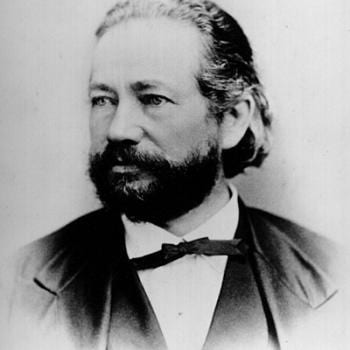
Three days ago, Bari Weiss published a simply phenomenal article at Tablet, where she is now writing again since being ousted from the Grey Lady, entitled “Stop Being Shocked.” Though I have a few (very few) quibbles, none of them are substantive. It is an insightful critique of the rising illiberalism of the elite, woke left. John McWhorter is quite right to call it a “masterpiece.” I will not use any of it here because everyone should read it, start to finish, but what I will snag is Weiss’ title as the guide to the commentary below. (See also Andrew Sullivan’s latest post, “Why Is Wokeness Winning?,” featuring similar themes.)
***
Somewhere (maybe in a Hitch 22 essay?) Christopher Hitchens quipped that the denial always precedes the justification. We’ve seen the truth of this insight firsthand in the race discussions in evangelicalism. About five years ago, we were in the denial stage. Critical Race Theory (CRT) was definitely not present in evangelical circles, in churches or seminaries. Resolution 9 marked a transition to the justification stage. Yes, CRT is in play, but its okay. The stage we have entered over the past year may require an amendment to Hitchens’ axiom. We are in the post-justification stage, one of unapologetic embrace.
For years, Neil Shenvi, despite presenting legitimate evidence to prove his case, struggled to convince people that CRT and other critical theories were making in-roads into evangelical Christianity (whatever “evangelical” means anymore). At this juncture, if there’s any doubt that critical social theories are making inroads in evangelicalism, a recent and shocking Christianity Today article, “The Shocking Necessity of Racial Violence,” should dispel it.
The author is Christina Edmondson (who has been mentioned before here at TCC), one of the co-hosts of the Truth’s Table podcast. Her article rambles a bit (hypocritical of me to say, I know), but this is the style presently in vogue when discussing race and the American church, and that’s no accident, as we will see. Edmondson, wittingly or not, is following a basic template that pervades—or rather is the lifeblood of—critical race scholarship.
Edmondson opens the article with the claim that “unrelenting violence and all of its forms—physical, psychological, and theological—is necessary to maintaining human subjugation.” Accordingly, “Racism requires violence.” Racism is a big, perhaps definitive, part of the American story, and therefore, so too is violence. Some of the opening paragraph is vague but not immediately worthy of wholesale rejection. Edmondson brings in, as support, the story of Olivia Hooker, a well-known psychologist, who has written about her childhood in Tulsa in the 1920s. She remembers white men breaking into her home and smashing her family’s belongings.
Edmondson writes,
Before smashing the piano, the intruders gently removed the closed Bible that was positioned atop the piano. This perverse version of Christianity, bound to white supremacy, effectively shoved aside the faith held by blacks before destroying property and personhood to maintain temporal and carnal power. The so-called shared faith of white Christians and black Christians does not guard against violence toward the Emmett Tills, Tamir Rices, or George Floyds of society.
These are terrible and true stories, to be sure. To the extent that the white Tulsa looters were justifying terrorizing black families with some half-baked, perverted form of Christianity, they deserve to be condemned, full stop.
But the connection between Hooker’s memories of actual white supremacists and segregationists smashing her family’s piano and the lynching of Emmett Tills on the one hand, and the cases of Tamir Rice and George Floyd is suspect. Edmondson has leapt over a fair amount of history to emerge with the thread—Hooker, Tills, Rice, Floyd—intact.
It is not tantamount to denying the existence of racism today to acknowledge a world of difference between the two sets of fact patterns, contextual and chronological difference. But Edmondson equivocates. From Hooker to Floyd is just one long, static story. It is white Christianity that failed to protect both Tills and Floyd from murder, in fact, (per Edmondson) white Christianity justified theses tragedies for its own self-interest.
As Rod Dreher put it, commenting on Edmondson’s article:
Emmitt Till was murdered by whites in Mississippi in 1955, in what was unmistakably a racist crime. The child Tamir Rice was shot by police in a 2014 accident when he pointed a toy gun at officers. That was a tragedy — but how in the world is it a racist act comparable to the murder of Emmitt Till? And in the George Floyd case, it is by no means clear that his death at the hands of Minneapolis police was motivated by racism. For Edmondson, though, the fact that the victims in all these cases were black is the only fact that matters.
We will come back to all of that momentarily. Edmondson continues (emphasis added):
White supremacy’s sinful dance, swaying back and forth between Klansmen’s sheets and clergy robes, pains and plagues Christian of color and lies to white Christians. Violence is not neutered or challenged. White Christianity’s very design exists to maintain false piety and sear the consciences of white people against the oppression and exploitation of blacks.
Now, it seems at this point that Edmondson is, by invoking “White Christianity,” simply referring to what was mentioned immediately prior, viz., the type of men who ransacked Olivia Hooker’s home, but as the reader proceeds it becomes evident that more is implied.
Through Isabel Wilkerson’s Caste: The Origins of Our Discontents, we find the necessary premise undergirding Edmondson’s analysis, to use the word loosely.
Isabel Wilkerson, in her new book, Caste: The Origins of Our Discontents, writes how America’s racism works within the broader and older idea of a caste system. Caste systems rely on dominance and inferiority and must be enforced and reinforced by violence: gun-toting militias, vigilante neighbors, under-policing, and corrupt over-policing to protect select neighborhoods from crime. This violence is even wielded, or conveniently ignored, by those who claim to follow the Prince of Peace.
This violence, says Edmondson is “not only physical, but deeply psychological and spiritual.” This spiritual manifestation of what Edmondson takes to be fundamental to our reality (e.g. a racial caste system) is manifested in “name-calling such as ‘heretic’ or ‘unbeliever.'” These accusations are “legitimized” through social power.
Edmondson adds, “How we think about our neighbor and enemy, resources and rights, duties and governance is both theological and political. Moreover, our theologies are political because how we live in light of who God is necessarily public, civic, and embodied.”
We now come to what is, on my reading, the point of the entire article:
Spiritual violence against black Americans in the political sphere means disparaging and minimizing the faith of black Christians. Appealing to the notion of a singular Christian worldview, Southern Baptist Seminary president Al Mohler stated in a room filled with white men that a vote for Trump in 2020 would be most in line with “Christian worldview.” Mohler’s statement went beyond the partisan and political. His statement was theological with significant implications for the unity of the church in America. As president of the flagship seminary for the largest Christian denomination in the United States, his religious endorsement of a highly controversial president known for racist and sexist rhetoric and actions mattered significantly.
Here Edmondson ties Al Mohler and those who share his political and theological opinions back to what has been surveyed so far. His endorsement of Trump ties him to the legacy of “white supremacy” and racial violence (spiritual and psychological). How? By asserting a “singular Christian worldview.” It is not so much what he said but what he implied by saying it, viz., a heretic-orthodox, believer-unbeliever binary. That is, he is “othering” or ostracizing those who disagree with him. This means that any definitive statement, any argument along lines of orthodoxy would qualify for perpetuating white supremacist Christianity.
Quoting Dreher’s hot take again, with which I fully concur:
This is appalling, and I cannot believe it was published by Christianity Today. Al Mohler may or may not be correct about the necessity for Christians to support Donald Trump. It is a prudential judgment. I know Christians who are completely unconflicted about voting for either Trump or Biden. But I also know Christians who are going to vote for Joe Biden, though they cannot abide the Democratic Party’s policies, because they believe that the continuing presence of Trump in office hurts the country. And I know Christians who are going to vote for Donald Trump, though they cannot stand him and think he has been a lousy president overall, because they believe that putting a Democrat in the White House would result in laws and policies that hurt the country more than having Trump does.
I don’t judge the quality of those people’s faith based on how they plan to vote, and I resent it when people do. Edmondson crosses some important lines in her denunciation of Al Mohler. She’s perfectly within her rights to criticize his judgment. But she goes farther. She accuses him of racism, simply for reaching a different political conclusion than black Christians — as if disagreeing with black Christians on political matters is necessarily racist. She puts words in Mohler’s mouth that he did not say. She accuses him of “politically motivated spiritual violence.” Coming right after a denunciation of the murderers of the Tulsa victims, and of Emmitt Till, as well as those who killed Tamir Rice and George Floyd, this is unconscionable. Christianity Today ought to be ashamed for publishing such slander.
Doubtless Edmonson has in mind, in the background, the suggestion peddled lately that because some 80-90% of black Christians vote Democrat, the insinuation of people like Mohler that voting Republican is the only defensible option for Christians smacks of racism. She nearly says as much,
By saying one’s “Christian worldview” leads to reelecting Donald Trump in 2020, Mohler asserts that faithful Christian theology applied to politics must draw the same political conclusions as most white conservative Christian men in this country.
And then,
This same assertion, proclaimed from pulpits, tweets, and faux confessional statements, put on trial the Christian integrity and witness of black Christians who have overwhelmingly voted against Donald Trump. Black women report some of the highest levels of Bible study, charitable giving, authoritative views on Scripture, amount of time praying, and church attendance. But because of their political and theological misalignment with Trump and Republican agendas, they are deemed by default biblically ignorant, and at worse, heretics, cultural Marxists, and whatever new term works to caricature and discredit those holding a differing view. Welcome to politically motivated spiritual violence.
Edmondson’s critique, wittingly or not, is trading in CRT-esque analysis. Setting up the dichotomy of heretic-orthodox, etc. as necessarily offensive and oppressive is dangerous territory to tread. It is, inter alia, an assertion of critical consciousness that decries such dichotomies for allegedly smuggling in the oppressive status quo (i.e. you’re either in or out). Such dichotomies it is claimed, are the source of social power for the dominant group over and against the sub-dominant.
Indeed, especially in Postcolonial Theory, it is held that the “in” group can only define itself through the existence of an “out” group. Law is defined over and against lawlessness; citizen contradistinguished from non-citizen. And the purpose of this maneuver is to establish superiority for whatever is defined as the “in” group and its members. In reality, it is claimed, “in” and “out” are merely social constructs in service to oppressive group-power dynamics. There is no essence to law other than to prioritize the lawful over the lawless. (Law and similar constructs must, therefore, always be presented in scare quotes or italics.)
This is what Edmondson is accusing Mohler and Mohler-ites of: an assertion of power by othering those they endeavor to suppress for the sake of maintaining the status quo. It is racialized spiritual and psychological violence (epistemological oppression).
Curiously, tells us that “How we think about our neighbor and enemy, resources and rights, duties and governance is both theological and political,” and so, all theology is political (a proposition I do not totally disagree with). But then, only a few lines later, she castigates Mohler for going ” beyond the partisan and political” with his endorsement of Trump (and more broadly the GOP).
All theology should be political—which in the CRT paradigm is to say, emancipatory—but Mohler, by applying his theological convictions to the practical, often sticky, realm of electoral politics, has gone too far, she posits, a confused and confusing stance unless one recognizes the knowledge base and theoretical assumptions from which her vocabulary and categories are being drawn.
This is all shocking, libelous stuff, to say the least. Of course, “violence” and “white supremacy” and “racism” have all been redefined in the public lexicon at the direction of CRT-influenced conceptions of the same. Even the New York Times recognizes this phenomenon to some extent. (Our preliminary requirement at the outset of any discussion of these issues must be that everyone define their terms precisely.)
In operation here is something like Robin DiAngelo’s definition of “white supremacy” featured in What Does It Mean to Be White?: Developing White Racial Literacy (indeed, a definition like DiAngelo’s is the only thing that can make Edmondson’s assessment work):
Remember: When I use the term “white supremacy”, I do not use it to refer to extreme hate groups. I use the term to capture the pervasiveness, magnitude, and normalcy of white dominance and assumed superiority.
And again in her book with Ozlem Sensoy, Is Everyone Really Equal?:
White power and privilege is termed White supremacy. When we use the term White supremcy, we do not mean it in its lay usage to indicate extreme hate groups such as the Ku Klux Klan. Rather, we use the term to capture the pervasiveness, magnitude, and normalcy of White privilege, dominance, and assumed superiority… When we use the term White supremacy, we are not referring to extreme hate groups or ‘bad racists.’ We use the term to capture the all-encompassing dimensions of White privilege, dominance, and assumed superiority in mainstream society.
Edmondson further condemns Mohler by placing him in a list with George Whitefield, Jonathan Edwards, and J. Gresham Machen, all of whom have been, at one time or another over the past few years, denounced as racists. Sandwiching Mohler’s name in there presents a clear message indeed.
***
Edmondson sounds a lot like Jemar Tisby here in his recent New York Times review of Robert P. Jones’ new book, White Too Long. Jones’ thesis is that (in his words), “American Christianity’s theological core has been thoroughly structured by an interest in protecting white supremacy.” Jones asserts that “The more racist attitudes a person holds, the more likely he or she is to identify as a white Christian.” Tisby describes the unique approach of White Too Long: “Jones builds his case with evidence, drawing on an eclectic blend of history, theology, sociology and memoir. His use of autobiography works especially well.”
Tisby concludes his review with this:
White Christians have to face the possibility that everything they have learned about how to practice their faith has been designed to explicitly or implicitly reinforce a racist structure. In the end, White Too Long seems to present a stark choice: Hold onto white Christianity or hold onto Jesus. It cannot be both.
Similarly, Edmondson signs off in the Christianity Today piece with, “White Christians, will your shared humanity and Christianity move you from violence and violence-denying to the nonviolence of empathy, solidarity, and repair?”
***
We also see in Edmondson’s piece another concerning element already alluded to above in the discussion of “othering.”
Doctrine has become instrumental. The only important question, one that sets “White Christianity” apart from, well, whatever Edmondson has in mind, is whether doctrine has proven emancipatory, whether it is conducive to change. Normative and theoretical debate is not Edmondson’s game here. She doesn’t critique Mohler for being incorrect but rather for being too rigid in the assertion of his opinion, and for perpetuating “White Christianity” by doing so.
***
I recently commented in a thread that some of the best critiques of CRT scholarship is found in those liberal academics of the late 1980s and early 1990s who were pushing back against the first round of race-crit scholarship from the likes of Derrick Bell, Kimberlé Crenshaw, and Mari Matsuda. The analysis of these liberals was clear eyed and by and large commonsensical, straightforward. Though I generally find the solutions offered by said analysis to be lacking (e.g. fighting the full flowering of the liberal project with an earlier stage of the same) it remains helpful. One such liberal critic of CRT was Douglas Litowitz. (He also wrote a very good critique of the use of Gramsci’s conception of hegemony [for the BYU law review, of all places] by certain CRT and feminist scholars).
Litowitz, who is, to some extent, sympathetic to the CRT project and seems to have himself flirted around with critical legal studies and Marxist legal theory, wrote in 1996:
CRT’s message about the legacy of racism is important, but one gets the impression that writing these pieces is a relatively easy game to play, that all one needs is an angle, a personal trait which can serve as an entrance into the game; and if one possesses several angles, she can write about how these facets intersect, that is, what it is like to lie at the “intersectionality” of blackness and femininity, or to be Latino and gay.
I am not a critical race scholar but I could probably produce a manuscript in this vein in a relatively short time by following the standard format. I would begin with a story about what it was like to grow up Jewish, how I went to temple, celebrated Passover, got ridiculed by kids at school, heard people refer to Jews as “kikes,” went to Germany and became depressed about the Holocaust, how I see swastikas in the bathrooms at the school where I teach, and so on. I could then discuss how Jews were discriminated against here in America, how we couldn’t attend certain schools, couldn’t vacation in certain places. And I could conclude by saying that anti-Semitism still exists today and that we should be on the lookout for it.
Litowitz then notes that as moving as the storytelling approach might be, it is, in the final analysis, irrelevant for constitutional theory (and leads to some strange places and lacks doctrinal solutions). Litowitz goes on to challenge the early expressions of critical consciousness from Bell and others, as well as the interest convergence thesis. He rightly discerns that the combination of these three elements not only dips into narcisim but risks balkanization of the discipline itself, wherein “each racial, ethnic, or gender category becomes a unitary focus, to the neglect of the fragile overlapping consensus which binds us.” What he’s partially getting at is CRT’s rejection of universalism and so-called sameness logic. Litowitz’s central criticism is that CRT is not properly a theory because all it offers is criticism— and, I would add, a replacement paradigm— and no coherent, workable solutions.
Anyway, the point is that Edmondson’s style is no coincidence. It follows, in its own way, this basic template found in much CRT literature. I am not accusing Edmondson of being a full-blown critical theorist of any stripe. What I am saying is that her approach is conspicuously similar to the distinct CRT style which is especially found in the current leaders of the Amazon bestsellers list, viz., Ibram Kendi and Robin DiAngelo, as well as Renni Eddo-Lodge. As I’ve described it before, the components are memoir, selective history, contemporary anecdotes, and political action program.
As with the 1619 Project, and Edmondson’s article, the type of history employed takes something true (and usually gruesome) about the past and then pushes it into the present without accounting for real change (either positively or circumstantially). Any change acknowledged is recast as no change at all, or rather, merely material but not formal change. Racism is just as bad, if not worse, than ever. It has merely adapted. The adaptation is a result of the effects of white interest convergence, and ultimately serves the status quo (which is always spoken of singularly regardless of what epoch of history is being referenced). That is, the new ways in which racism allegedly manifests are tactical, providing whites with plausible deniability at every turn. The narrative of a post-racist society is usually cited here. If racism is a thing of the past then, it is argued, whites can deny that society is still stratified along racial lines, etc.
All of this is an idealist move. The object of critique is frozen in time so that the critique can transcend the initial, constitutive circumstances and be applied perpetually. Marxism does the same thing. For all his historical materialism, Marx never did quite shake off the Hegelian inheritance (which is especially evident in his early work).
Capitalism, in Marx, exists in a static ideal state. If Marx’s conception of capitalism had been true, then his predictions as to its implosion would have likely come true. Marx’s idealism is further evidenced in that whilst history is driven by immutable laws predicated solely on a materialist worldview, it is the emergence and triumph of class consciousness that is the true, indisputable mover. The mind triumphs over the material conditions.
In the case of the 1619 Project, the conflict over slavery in the mid-19th century is made definitive for all of American history, before and after, and thereafter pushed into the present. This is brand of historiography is of limited utility other than for activism. And whilst every historical account is necessary selective, there must be coherence and careful parsing of differences between the time periods in view (however periodization is organized). (While we’re on the subject of history, see this review of Tisby’s Color of Compromise in Reformed Faith and Practice.)
The propensity for race crits to make a particular narrative totalizing for all that is in their crosshair is one of the reasons that I describe CRT as being more fundamentally Marxist than Foucauldian or postmodern. The latter abhorred such artificial continuity. Indeed, Foucault thought it impossible to compare one historical instance with the next, to find any true commonality that was not already falsely mediated through a power-laden discourse.
***
One last thing. I do not want to delve into this aspect too much but another line, an unproven assumption that, nevertheless does substantial work, in Edmondson’s op-ed deserves attention.
Most people, I imagine, watched in horror the recent footage of the unarmed black men killed in 2020 and wept through the details of Breonna Taylor’s death. Even those who deny systemic racism likely oppose the in-your-face violence of public lynchings. However, the horrors of 2020, coupled with the trauma-cementing psychological and spiritual violence of news networks popular to white “conservative Christians,” discredit each victim. Prominent white church leaders and their political candidate pile on by publicly minimizing or justifying their deaths.
The first sentence is unobjectionable. I too imagine that most people do not like violence of any kind, whatever the cause. But an issue that I consistently run into when discussing CRT and related issues is demonstrated here, in the second sentence of the excerpt. Edmondson perpetuates a thus far unproven assumption, one that (per the commentary above) serves the approach of her entire piece. The racial violence, as attached to recent high-profile cases, has yet to be substantiated.
Heather Mac Donald, among others, has challenged the dominant story that connects the admittedly tragic deaths of George Floyd and Breonna Taylor with lynchings of the postbellum south. This story carries with it the suggestion that police forces themselves are vestiges of slaveholder culture, and that police departments are bastions of unconscious racial bias and carry on the legacy of systemic murder of black Americans. Hence, the “abolish the police” movement.
Mac Donald:
For the last five years, the police have fatally shot about 1,000 civilians annually, the vast majority of whom were armed or otherwise dangerous. Black people account for about 23% of those shot and killed by police; they are about 13% of the U.S. population.
As of the June 22 update, the Washington Post’s database of fatal police shootings showed 14 unarmed Black victims and 25 unarmed white victims in 2019. The database does not include those killed by other means, like George Floyd.
The number of unarmed Black shooting victims is down 63% from 2015, when the database began. There are about 7,300 Black homicide victims a year. The 14 unarmed victims in fatal police shootings would comprise only 0.2% of that total.
(When Mac Donald began publicizing the findings, from the Proceedings of the National Academy of Sciences, of two psychologists who claimed that once “race specific rates of violent crime” are taken into account, there are no disparities among those fatally shot by the police, the authors disavowed their study and the PNAS de-published it.)
In part, what Mac Donald has shown is that disparities related to policing is based on causal factors other than racism. If racism is, indeed, the, or even a, cause of an identified disparity in policing and police-related violence, then the other evident causes must either be adequately rebutted or integrated into the racism causality interpretation. No sensible person is against law enforcement reform. But no sensible person is for abolishing police in toto, least of all average black Americans.
People like Edmondson might reject the kind of case made by Mac Donald as white ignorance or avoidance, but the burden is upon them to prove their narrative in spite of what the statistics show. Said statistics do not mean that racism is never present in police departments, or that some disparities feature racism as a causal factor. It simply means that we cannot decide such is the case at the outset and subsequently construct a narrative around unproven assumptions.
The point is that describing the deaths of Floyd and Taylor as modern day lynchings is misleading (but it helps the narrative of enduring white supremacy, as redefined by CRT). There is no evidence of racism as a causal factor in either case. I have deep concerns regarding many of these recent cases.
Ahmad Arbery, like Trayvon Martin, was unrelated to police activity so I will ignore those at present, as horrifying as they were (Arbery’s in particular evidencing potential for racial animus on the part of the perpetrators); it is imprecise to rope them in with deaths where police were involved for the sake of solidifying the narrative. The cases of Floyd and Taylor present various problems, to be sure, more so with the latter. I will not pontificate on them, given that we do not quite know the whole story even now. But with Taylor’s case in particular, there are several issues surrounding the no-knock warrants and self-defense (and legal gun ownership) on the part of Kenneth Walker III that will (and should) force us to reassess relevant policies.
If white conservatives Christians are actually discrediting or justifying these incidents, then they should be held accountable. I have not seen that. Al Mohler has spoken on The Briefing at length about each of these cases, never once justifying the violence or laughing off the deaths, or the like, but rather lamenting their occurrence. But he is, nevertheless, complicit in the violence because the operative narrative in Edmondson’s critique is that these incidents are a continuation of white supremacist violence and Mohler’s “othering” of dissenting theologies is itself violence that excuses and props up the epidemic of anti-black violence in the streets at the hands of racist cops. People like Mohler sear the consciences of fellow whites so that modern day lynchings do not shock them; so that the “othering” of “other” theological perspectives does not concern them.
Mohler is, per Edmondson, enabling white Christians to both embrace their white supremacy and ignore the suffering around them. This is a shocking accusation, especially since it is predicated both on a bunk, unfalsifiable theoretical framework, and unproven factual assumptions. But, at this stage in the woke game, heeding the wisdom of Weiss, it probably should not shock us anymore. Given what we’ve seen of late–the evident and gleeful antipathy for Trump and Trump voters, the flirtation with wokeness, and very strange policy prescriptions for churches being faced with having their tax exemptions revoked– what is shocking is that Christianity Today hadn’t published an article like this already. More shocking still is that evangelicals still read it. If I was not making a concerted effort to stay abreast the woke-ish goings on in evangelicalism I would surely never read Billy Graham’s periodical ever again. The deterioration in standards of both doctrine and tone of evangelicalism’s flagship publication concides with a erosion of similar character in evangelicalism itself.











